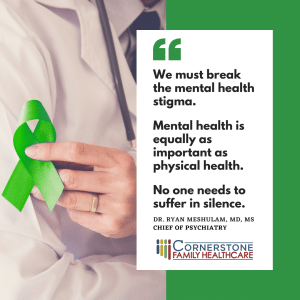Provider blog written by Allan Fernandez, MD
It’s that time again where we celebrate men’s health for the month of June. There are many conditions we can discuss that would pertain to men’s health such as the prostate, cardiovascular health, diabetes, adequate sleep, smoking and drinking, etc. However, the most important element of all is having your routine visit with your primary care provider. They would know what to look for, what to screen for, and above all, what to treat for.
When we think of men’s health, one of the health conditions we often think almost immediately is prostate cancer. According to the Center of Disease Control (CDC), prostate cancer is the most common non-skin cancer among American men. Over 30 million men suffer from prostate conditions that impact their quality of life. Each year over 230,000 men will be diagnosed with prostate cancer and about 30,000 will succumb from it.
Two common ways of screening for prostate cancer is either through a Digital Rectal Exam (DRE) and/or checking for prostate specific antigen, otherwise known as PSA. According to the American Cancer Society, average-risk men are typically screened after the age of 50. However, men with higher risk, such as those with a family history of prostate cancer or exposure to carcinogens, are typically screened at an earlier age. When your provider performs a DRE, they are determining the size, shape, and contour of your prostate. Normally, it is often described as a smooth walnut-sized gland. If there are any abnormalities, further studies need to be conducted. In addition, a PSA can also be checked and as a rule of thumb, higher levels of PSA may pose an issue. Keep in mind that there are several factors that can cause an elevation of PSA such as age, race, enlarged prostate, medications, and infections. As you can see, the list is endless. A simple visit with your provider and discussing options is likely the better decision.
According to the U.S. Department of Health and Human Services, men are more likely to smoke, drink, make unhealthy risks or choices, and put off regular checkups and medical care. By not caring for your health, you may be limiting your life expectancy. On the other hand, by seeking care for your health by getting screening tests that are right for you, making sure you are up to date on important shots/vaccinations, watching out for signs of health problems like diabetes or depression and eating healthy and staying active may be the best choice. It is never too late to start healthy regardless of age. By making a fresh start or even continuing your healthy lifestyle, you reduce your blood pressure, blood sugars, cholesterol, and weight. With an active and healthy lifestyle, you decrease your chances of diabetes mellitus type 2 and cardiovascular disease.
Keep in mind that preventative medicine is the best medicine. Most people think that visiting your primary care provider is for when you get sick, however, we are also here to prevent you from getting sick. Don’t be embarrassed to talk about your health and your concerns. We, at Cornerstone Family Health are here to help. As experienced health professionals, we are here to answer your questions and provide you with the best health care.




